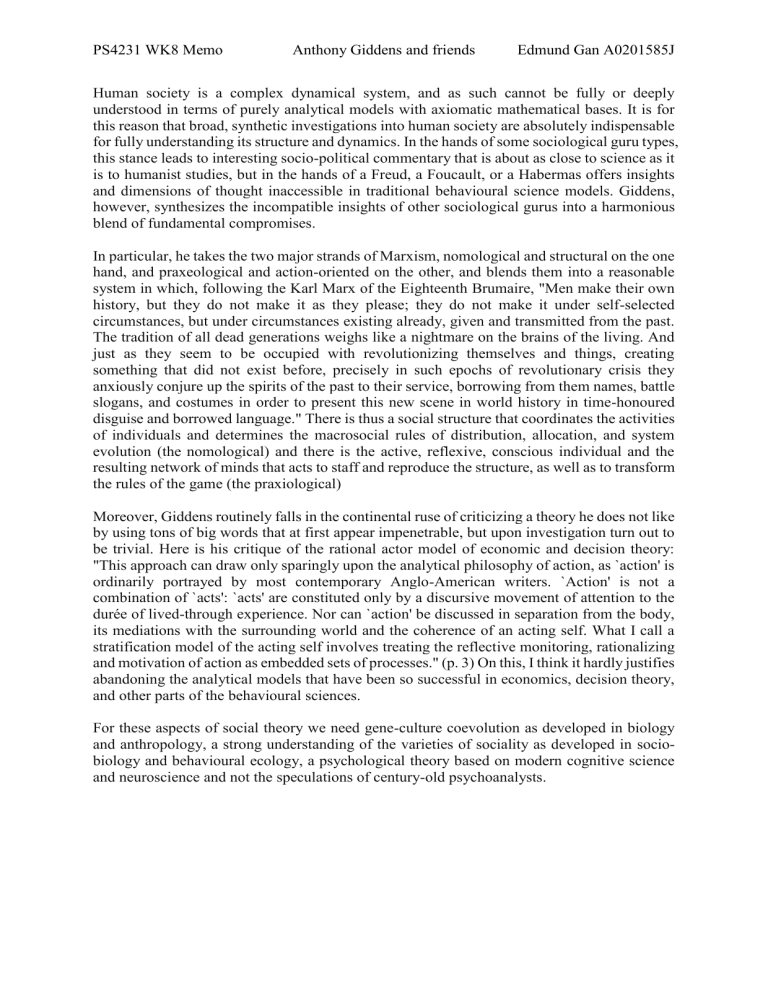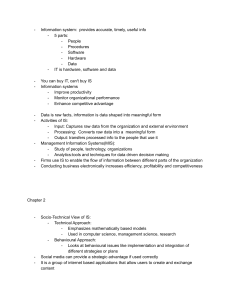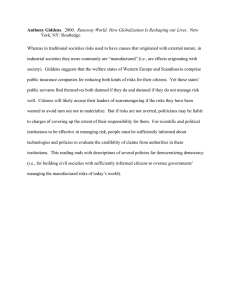
PS4231 WK8 Memo Anthony Giddens and friends Edmund Gan A0201585J Human society is a complex dynamical system, and as such cannot be fully or deeply understood in terms of purely analytical models with axiomatic mathematical bases. It is for this reason that broad, synthetic investigations into human society are absolutely indispensable for fully understanding its structure and dynamics. In the hands of some sociological guru types, this stance leads to interesting socio-political commentary that is about as close to science as it is to humanist studies, but in the hands of a Freud, a Foucault, or a Habermas offers insights and dimensions of thought inaccessible in traditional behavioural science models. Giddens, however, synthesizes the incompatible insights of other sociological gurus into a harmonious blend of fundamental compromises. In particular, he takes the two major strands of Marxism, nomological and structural on the one hand, and praxeological and action-oriented on the other, and blends them into a reasonable system in which, following the Karl Marx of the Eighteenth Brumaire, "Men make their own history, but they do not make it as they please; they do not make it under self-selected circumstances, but under circumstances existing already, given and transmitted from the past. The tradition of all dead generations weighs like a nightmare on the brains of the living. And just as they seem to be occupied with revolutionizing themselves and things, creating something that did not exist before, precisely in such epochs of revolutionary crisis they anxiously conjure up the spirits of the past to their service, borrowing from them names, battle slogans, and costumes in order to present this new scene in world history in time-honoured disguise and borrowed language." There is thus a social structure that coordinates the activities of individuals and determines the macrosocial rules of distribution, allocation, and system evolution (the nomological) and there is the active, reflexive, conscious individual and the resulting network of minds that acts to staff and reproduce the structure, as well as to transform the rules of the game (the praxiological) Moreover, Giddens routinely falls in the continental ruse of criticizing a theory he does not like by using tons of big words that at first appear impenetrable, but upon investigation turn out to be trivial. Here is his critique of the rational actor model of economic and decision theory: "This approach can draw only sparingly upon the analytical philosophy of action, as `action' is ordinarily portrayed by most contemporary Anglo-American writers. `Action' is not a combination of `acts': `acts' are constituted only by a discursive movement of attention to the durée of lived-through experience. Nor can `action' be discussed in separation from the body, its mediations with the surrounding world and the coherence of an acting self. What I call a stratification model of the acting self involves treating the reflective monitoring, rationalizing and motivation of action as embedded sets of processes." (p. 3) On this, I think it hardly justifies abandoning the analytical models that have been so successful in economics, decision theory, and other parts of the behavioural sciences. For these aspects of social theory we need gene-culture coevolution as developed in biology and anthropology, a strong understanding of the varieties of sociality as developed in sociobiology and behavioural ecology, a psychological theory based on modern cognitive science and neuroscience and not the speculations of century-old psychoanalysts.



